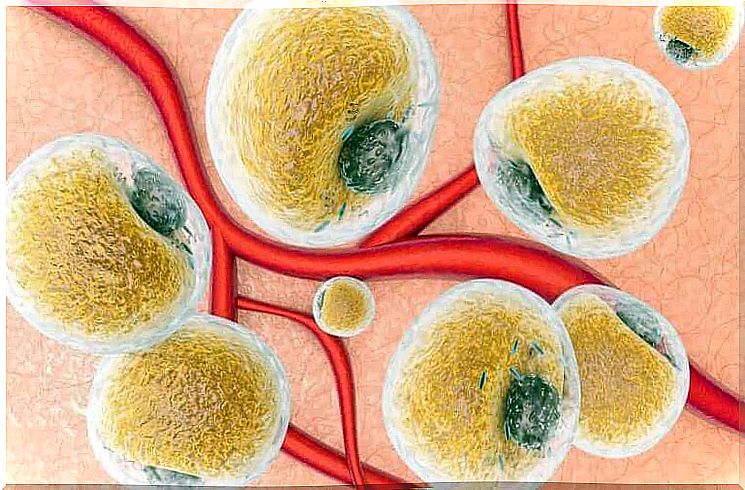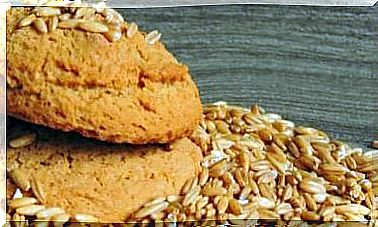Cellular Inflammation And Obesity
Cellular inflammation is an imperceptible inflammatory condition which, although it occurs for defensive purposes, is harmful when it becomes chronic. In these cases, it ends up causing non-physiological conditions such as obesity.

Did you know that people with obesity have what is called a mild inflammatory state? It is not yet clear whether this condition precedes or follows weight gain, although it is clear that the relationship between cellular inflammation and obesity exists. We will explain what it is and how to fix it below.
The inflammatory state characteristic of people with obesity shows once again that our eating behavior – thoughts, decisions and actions related to food – goes beyond wanting or not wanting, our relationship to food. being much more complex than that.
What is Cellular Inflammation
We speak of silent – or low intensity – cellular inflammation to denote the imperceptible inflammation of an organ or tissue that occurs as a result of the activation of inflammatory mechanisms in response to the detection of a threat..
However, although this is an important defense mechanism, its activation stimulates the secretion of enzymes that will attack healthy tissue to get rid of the problem. So if it becomes chronic – through continued exposure to harmful agents – it ends up damaging the organ or tissue in question.
Cellular inflammation and obesity
Currently, obesity can be defined as a chronic low-grade inflammatory condition caused by:
- Changes in the gut microbiota
- Oxidative stress
- Excessive release of pro-inflammatory factors
- Over-activation of peripheral macrophages
In this sense, it seems that the relationship between cellular inflammation and obesity begins in adipose tissue. The enlarged adipocytes of an obese person secrete pro-inflammatory cytokines and these, in turn, attract pro-inflammatory macrophages. All of these substances eventually spread throughout the body.
In addition, most of the habits that generate obesity – stress, junk food, insomnia, sedentary lifestyle – are pro-inflammatory in themselves and, along with the pro-inflammatory substances associated with the adipose tissue of obese people, end up generating a generalized inflammatory state. which affects most of the body.
Thus, the inflammation generated by adipose tissue is aggravated by that caused by the factors that generate it. This means that obesity has two foci responsible for its inflammatory state. On the one hand, adipose tissue. On the other hand, the harmful habits that result from it.

Cellular inflammation and hormone resistance
The end result is the emergence of resistance to insulin, the hormone responsible for fat storage. But also leptin, the hormone responsible for satiety. This results in increased appetite, increased body fat, and with it increased cellular inflammation.
So, we can see that cellular inflammation and obesity – excess body fat – form a positive feedback loop . The greater the obesity, the greater the inflammatory state, and vice versa.
How to resolve cellular inflammation?
From the above, it can be understood that resolving cellular inflammation is essential if one is to take an effective approach to obesity. We show you below what you can do to remedy this inflammatory condition.
Omega 3 (EPA)
Current research shows that eicosapentaenoic acid (EPA) has great anti-inflammatory power. When supplemented at optimal doses, it is effective against cellular inflammation.
In this sense, one might think that its supplementation is dispensable. However, while it is true that EPA is found in some foods, our diets cannot provide enough of it. The main natural source is fatty fish, which is usually eaten cooked and the heat oxidizes omega-3s.
Such a heat effect could be avoided by using plant foods which, being rich in omega 3, can be consumed without any heat treatment. This is the case with dried fruits, for example. While it is true that they contain omega-3 (ALA), they cannot be used by our body.

The role of butyric acid in cellular inflammation
Butyric acid supplementation has also been shown to be effective against cellular inflammation. When we buy it, we need to make sure that the product has an enteric coating. It is only in this way that butyric acid will reach the intestine without being broken down.
However, in this case and unlike omega 3, supplementation is not necessary. To get butyric acid naturally, all you need is a healthy gut microbiota and a sufficient amount of soluble fiber.
Avoid pro-inflammatory behaviors
Among the behaviors that promote the inflammatory state we have discussed, we find:
- Insomnia
- Sedentarism
- The stress
- Consumption of harmful fats : lamb, fatty parts of pork and beef, viscera, industrial bakery products
- Sugar consumption : table sugar, processed foods
- Also, the consumption of foods with a high glycemic index: white rice, white pasta, flour, white bread
- High exposure to environmental pollution
- Consumption of toxins : alcohol, tobacco
- Excessive use of chemicals: perfumes, deodorants
Antioxidants against cell inflammation
If we want to fight cell inflammation, it is essential to increase the consumption of antioxidants. This can be done through foods such as fruits, vegetables, dried fruits, and extra virgin olive oil. Or by supplements based on vitamin E, selenium or astaxatin for example.
When we talk about obesity, we often make the mistake of thinking that it is all about willpower. However, this will or refusal has an origin that must be resolved in order to modify obesogenic behavior. And cellular inflammation is one of the components.









